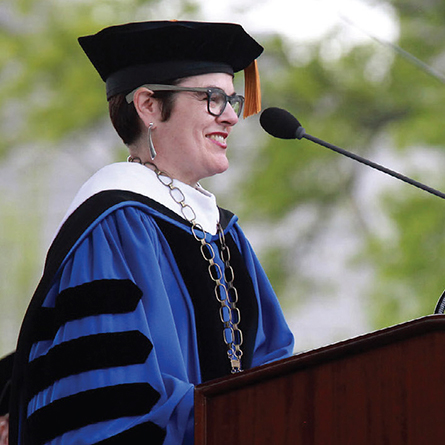A Whole New Way of Listening
The following is an excerpt from President Katherine Bergeron’s remarks at the 98th Commencement of Connecticut College.

And yet, even as I say that, I have to acknowledge that this was also a year in which the Pope came to remind us again of our responsibility to each other and to the planet, and—for the first time in history—doing so in the context of addressing climate change. That was big.
This was a year, too, in which a team of physicists from around the world proved the existence of gravitational waves, thereby confirming a major part of Einstein’s 100-year-old theory of general relativity and fundamentally changing our understanding of the cosmos. That was bigger. And perhaps more important, like the Pope’s message, it was hopeful.
In fact, in all the dense astrophysical discussion that accompanied the news, I was struck by a comment from Dr. Alberto Vecchio—one of the participating researchers— describing the deeper meaning and purpose of the discovery. This is what he said: “We have opened a whole new way of listening that will allow us to discover phenomena we have never seen before.” Think about that for a moment. A whole new way of listening. Leading us to things we have never seen before. This strikes me not just as good news for science. It may also be one of the most important lessons for our time: a new way of listening that has the power to change the world as we know it.
That idea makes me think about a talk that Bryan Stevenson delivered on this campus at the beginning of April. The talk was about how you can change the world, and its main points are worth recalling here. Stevenson, as you may know, is a highly acclaimed public interest attorney and founder of the Equal Justice Initiative in Montgomery, Alabama—and he has spent his life defending people on death row. He’s written about his life’s work in a powerful book called Just Mercy, which some of you may have read. There were four things he said you have to do to change the world. The first thing he said was you have to get proximate. You can’t make a difference without getting close to the people or places you want to affect. Second, he said, you have to work to change the narrative. The way you represent the world has a lot to do with how you can change it. Third, he said, you have to hold on to your hope. No positive movement ever came out of despair. But at the same time, he said, you have to be willing to be uncomfortable. No progress or growth is going to be possible without your personal discomfort.
And it occurs to me, as I think back on this talk, that all of these actions, in some fundamental way, have to do with listening. It’s listening that allows you to get proximate. Listening is always the first step to changing the narrative. It’s by the effort of listening that you open yourself to new possibilities that bring hope. And, of course, by listening, really listening, you will experience discomfort, the noise and discord of those things you don’t recognize or understand. You can’t change the world, in other words, without cultivating a whole new way of listening. And we are counting on all of you graduates of this great class to do just that: to open your ears and your hearts, to keep pushing the limits, in order to show us those things that we did not believe were possible.
To read President Bergeron’s full remarks, and for more Commencement coverage, such as the alma mater remix and Commencement video, see www.conncoll.edu/commencement.